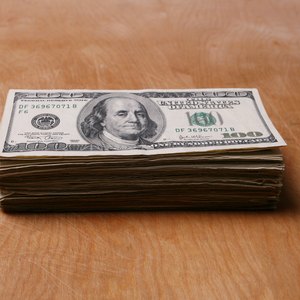
Treasury bills are one of several types of securities issued by the U.S. Government. When there's a period of inflation, you can usually expect to earn a higher interest rate on Treasury bills. Of course, some of those higher earnings on paper will essentially be eaten up by inflation, as the actual value of the dollars that the Treasury is paying out as interest are worth less than they'd be with less inflation. Still, Treasury securities, backed by the federal government, function as secure interest-bearing investments with a guaranteed return on principal, so they can be a good choice for sum investors.
Tips
As a general rule, economic inflation will cause the interest rate on Treasury bills to rise, while deflation will cause the interest rates to fall.
Understanding Inflation Rates
The inflation rate can be defined simply as the changing rate of prices, calculated on a monthly or yearly basis. The rise in prices is measured by comparing the Consumer Price Index or CPI for different periods. You can find many inflation calculators online to do this computation for you.
Exploring Causes of Inflation
Inflation or more specifically, monetary inflation, is generally due to an increase in money being circulated. This means more deposits held in foreign banks and more cash in savings and checking accounts. If the government increases circulating money faster than companies can manufacture enough goods, more people demand the goods since more money exists to pay for them and this pushes prices higher. Additionally, since the amount of money in circulation has increased, each dollar has less value and every business must raise its prices just to get the same value it used to get for its products.
Evaluating Treasury Bills
Treasury bills, sometimes called T-bills, function as short-term investments issued by the federal government. They mature in periods of one, three or six months. The interest rate on T-bills is said to be "implied." This means that you buy the T-bill for less than its face value. At maturity, the difference between what you paid and the face value is the interest you earned.
Inflation's Effect on Interest
Inflation and the expectations of future inflation factor into the implied interest rates for T-bills. Historically, a period of relatively high inflation rates is usually associated with relatively high T-bill interest rates. The reverse scenario is also true.
Many additional factors cause T-bill rates to fluctuate up and down, such as supply and demand. When investors feel the stock market is too erratic or risky, they look for more stable places to put their money, and this creates a higher demand for T-bills, as less risky investments. Conversely, the government may choose to issue a higher supply of T-bills, and this will drive rates down since more have become available.
References
- Treasury Direct: Treasury Bills in Depth
- Bureau of Labor Statistics: CPI Inflation Calculator
- Causes of Inflation - Economics Help
- Individual - Treasury Bills
- TreasuryDirect. "Treasury Bills: Rates & Terms." Accessed May 4, 2020.
- TreasuryDirect. "Treasury Bills." Accessed May 4, 2020.
- TreasuryDirect. "Treasury Bills FAQs: What Kind of Interest Payments Will I Receive If I Own a Treasury Bill?" Accessed May 4, 2020.
- Federal Reserve Bank of San Francisco. "What Makes Treasury Bill Rates Rise and Fall? What Effect Does the Economy Have on T-Bill Rates?" Accessed May 4, 2020.
Writer Bio
Cynthia Gaffney has spent over 20 years in finance with experience in valuation, corporate financial planning, mergers & acquisitions consulting and small business ownership. She has worked as a financial writer for online finance publications since 2011, including eHow Money, The Motley Fool, and Sapling.com. She has also edited for several online finance publications, including The Balance, Opposing Views:Money, Synonym:Money, and Zacks.com. A Southern California native, Cynthia received her Bachelor of Science degree in finance and business economics from USC.
